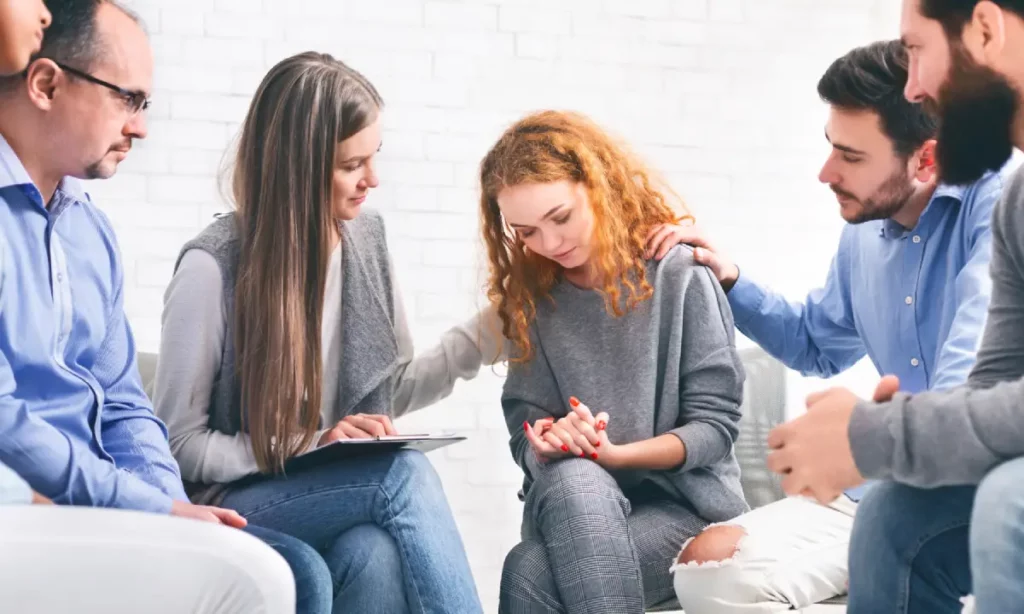Are you tired of the heavy weight of depression dragging you down, making every day a challenge? You’re not alone. Many people experience the same struggle, feeling lost in the depths of despair. But there’s hope. In this blog, we’re here to guide you through the power of group therapy for depression, a beacon of light in the darkness.
Imagine a place where you’re not alone in your battle, where others understand your pain and are ready to support you. Group therapy for depression is that place. We’ll explore how it works, what to expect, the remarkable benefits, and how it can help you in transformation. Let’s get started!
Contents
Understanding Group Therapy for Depression
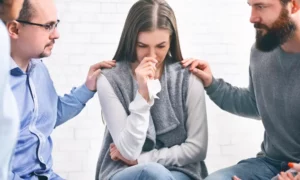 Depression is often a lonely journey, marked by isolation and overwhelming emotions. Group therapy for depression is a different path, a road less traveled but filled with healing possibilities. It’s essential to understand the core of this therapy to embark on this collective journey effectively.
Depression is often a lonely journey, marked by isolation and overwhelming emotions. Group therapy for depression is a different path, a road less traveled but filled with healing possibilities. It’s essential to understand the core of this therapy to embark on this collective journey effectively.
In group therapy, individuals who share similar struggles with depression come together to support and heal one another. The power of this approach lies in the shared experiences and the strength of connection. Together, participants explore their emotions, thoughts, and behaviors, often under the guidance of a skilled therapist.
The primary goal is to provide a safe and empathetic environment where everyone can express themselves, learn from each other, and develop coping skills. Therefore, understanding group therapy for depression is the first step towards finding a community that can uplift and inspire. It’s a place where you can truly connect with others who comprehend your pain, and together, work towards healing and hope. This understanding sets the stage for exploring how group therapy operates, its benefits, and what to expect on this transformative journey.
How Does Group Therapy Help People with Depression?
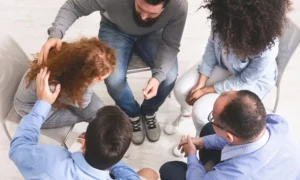 Group therapy is a unique and powerful approach for individuals struggling with depression. Here’s how group therapy can make a profound difference in the lives of those dealing with depression:
Group therapy is a unique and powerful approach for individuals struggling with depression. Here’s how group therapy can make a profound difference in the lives of those dealing with depression:
- Shared Support: In group therapy, you are not alone in your struggle. Others in the group understand your pain because they’ve been there too. This shared support creates a sense of community and reduces the isolation that often accompanies depression.
- Validation and Empathy: Expressing your feelings and experiences in a group setting allows you to be heard and understood. Other participants can validate your emotions and offer empathy, which can be incredibly healing.
- Learning and Coping: Group therapy provides an opportunity to learn from others. You can gain insight into different coping strategies, new perspectives on your challenges, and practical tools to manage your depression.
- Social Connection: Depression can lead to social withdrawal, but group therapy offers a safe and structured environment to rebuild social connections. You can practice social interactions and develop or rekindle valuable relationships.
- Feedback and Accountability: Group members can provide honest feedback and hold each other accountable for their goals and progress. This constructive feedback helps individuals grow and make positive changes.
- Enhanced Self-Awareness: Sharing your experiences and hearing others’ stories can promote self-reflection and enhance self-awareness. This self-discovery is a key component of the healing process.
- Safety and Confidentiality: Group therapy is conducted in a safe and confidential environment, allowing you to express your feelings without fear of judgment or breach of privacy.
The power of group therapy for depression lies in its ability to create a nurturing community that fosters understanding, learning, and growth. This approach provides individuals with the tools and support needed to break free from the grip of depression and embark on a path to recovery.
What to Expect in a Group Therapy Session
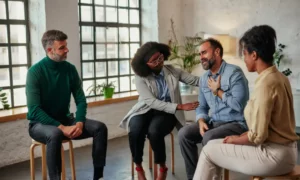 Participating in group therapy for depression can be a transformative experience, but it’s natural to wonder what a typical session entails. Here’s an overview of what you can expect:
Participating in group therapy for depression can be a transformative experience, but it’s natural to wonder what a typical session entails. Here’s an overview of what you can expect:
- Structured Format: Group therapy sessions are typically structured and guided by a trained therapist. The therapist ensures that each session follows a specific format designed to foster a safe and productive environment.
- Confidentiality: The content of the discussions within the group is strictly confidential. This confidentiality is essential to create a safe environment where participants can freely express their thoughts and feelings.
- Open Discussions: Group therapy encourages open discussions about depression, its impact on daily life, and strategies for coping. Participants can share their experiences, challenges, and progress.
- Therapeutic Techniques: The therapist may employ various therapeutic techniques during the session. These techniques can include cognitive-behavioral exercises, mindfulness practices, and role-playing.
- Supportive Environment: Group therapy sessions are designed to be supportive and empathetic. Participants can expect to receive understanding and encouragement from both the therapist and their peers.
- Constructive Feedback: Feedback from the therapist and fellow participants is a fundamental aspect of group therapy. Constructive feedback can provide new perspectives and insights for personal growth.
- Homework and Practice: In some cases, participants may receive homework assignments or exercises to practice between sessions. These assignments serve to strengthen the skills acquired during therapy.
- Consistency: Group therapy is typically conducted on a regular schedule, such as weekly or bi-weekly meetings. Consistency is key to creating a sense of routine and ensuring that participants have the opportunity to make progress over time.
While the specific structure may vary depending on the therapist and the group’s goals, you can generally expect a supportive and structured environment that encourages personal development and recovery from depression.
Therapy Techniques Used in a Group Setting for Depression: Strategies for Healing
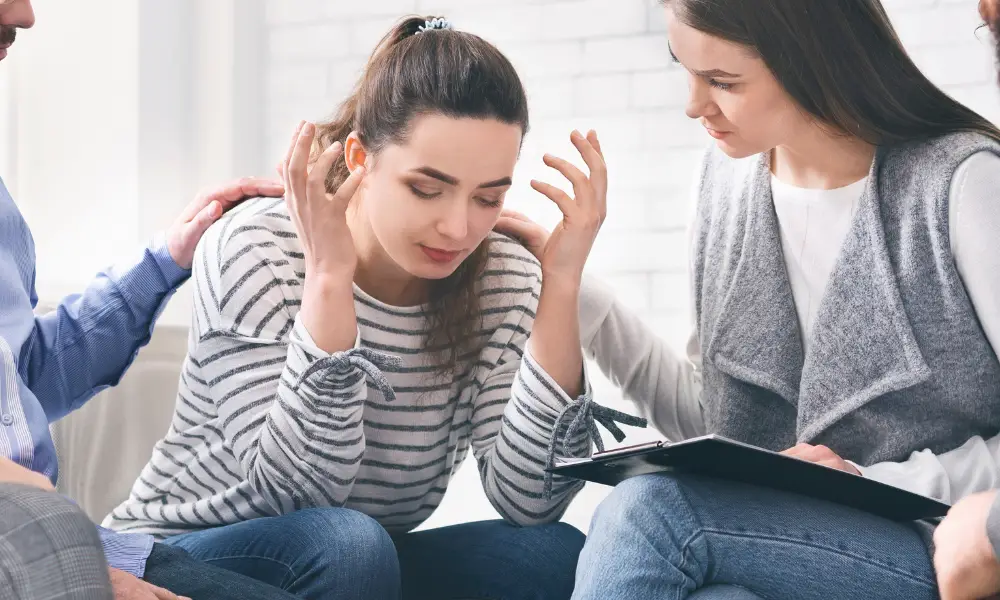
Group therapy for depression is more than just a gathering of individuals; it’s a structured and purposeful approach to healing. Within the safety of the group, participants are introduced to various therapeutic techniques aimed at managing and alleviating depressive symptoms. Here, we’ll explore some of these essential strategies for your well-being:
Cognitive Behavioral Techniques
Group therapy often incorporates cognitive-behavioral techniques. Participants learn to recognize negative thought patterns and reframe them into more constructive and positive thinking. This shift in cognition can significantly reduce depressive symptoms.
Mindfulness and Relaxation
Therapists introduce mindfulness techniques to help individuals stay present in the moment, reducing rumination and excessive worry. Breathing exercises and progressive muscle relaxation are common tools used to foster relaxation and emotional balance.
Problem-Solving Skills
Participants are guided in developing effective problem-solving skills. This helps individuals confront challenges and difficulties in a constructive manner, reducing the impact of stressors that may contribute to depression.
Interpersonal Skills
Group therapy often emphasizes the development of interpersonal skills. Participants can practice effective communication, assertiveness, and conflict resolution, enhancing their social interactions and relationships.
Journaling
Keeping a journal is encouraged as a therapeutic tool. It allows individuals to express their thoughts and feelings, gain insights into their emotional experiences, and track their progress over time.
Visualization and Guided Imagery
Visualization exercises can redirect thoughts and emotions. A therapist may guide participants through mental imagery to create a positive and emotionally soothing mental space.
Art and Expressive Therapies
Some group therapy sessions may incorporate art and expressive therapies. These creative outlets enable individuals to express themselves and explore their emotions through various forms of art, promoting healing.
Setting Personal Boundaries
Learning to set healthy boundaries with oneself and others is an important aspect of group therapy. It empowers individuals to protect their mental well-being and assert their needs.
These group therapy techniques are not only strategies for healing but also practical tools for your day-to-day life. The collective support of the group amplifies their effectiveness, making group therapy a dynamic and valuable resource for individuals grappling with depression. By exploring and practicing these techniques within the group, you gain valuable skills to help you manage and overcome depressive symptoms.
Finding a Suitable Group Therapy For Depression Near Me
If you’re seeking effective group therapy for depression and wondering, “Is there a suitable group therapy for depression near me?” TherapyMantra is here to help. Our commitment to your mental well-being is unwavering, and we offer accessible, high-quality group therapy services designed to support your journey toward a brighter and more fulfilled life.
Why Choose TherapyMantra for Group Therapy:
- Expert Therapists: Our group therapy sessions are led by experienced and compassionate therapists who specialize in depression and related conditions.
- Comfortable Environment: We provide a safe and welcoming space for your group therapy sessions, ensuring that you feel comfortable and supported throughout your therapeutic journey.
- Customized Approaches: At TherapyMantra, we offer tailored therapy sessions according to your specific needs and goals.
- Collaborative Support: Group therapy at TherapyMantra fosters a sense of community and shared understanding. You’ll have the opportunity to connect with others facing similar challenges, creating a support network that can be invaluable.
- Flexible Scheduling: We offer group therapy sessions at various times to accommodate your schedule and ensure that you can access the support you need.
- Online Options: In addition to in-person group therapy, we offer the flexibility of online group sessions, allowing you to participate from the comfort of your own home.
If you’re ready to embark on a journey of healing and personal growth, TherapyMantra is here to guide you. Join our group therapy sessions and discover the transformative power of collective support, understanding, and evidence-based therapeutic techniques in managing depression.
Conclusion
Dealing with depression can be an isolating and challenging experience, but you don’t have to face it alone. At TherapyMantra, we offer a range of effective therapies, including Online Depression Counseling designed to provide the support and tools you need to overcome depression and lead a happier, more fulfilling life.
If you are experiencing depression-related issues, it’s time to take that important step toward healing. Don’t wait any longer—book a trial online therapy session with TherapyMantra. Together, we can work towards a future filled with positivity, resilience, and well-being. Your path to recovery begins here.
